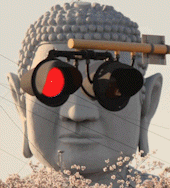| Hot Topics | |
|---|---|
U.N To Assess Discrimination in Japan
44 posts
• Page 2 of 2 • 1, 2
Institutional racism might be more prevalent than in other developed nations (I don't know that that's true though) but I don't think that means that the people of Japan are any more racist than other people.
Faith is believing what you know ain't so. -- Mark Twain
-

Samurai_Jerk - Maezumo
- Posts: 14387
- Joined: Mon Feb 09, 2004 7:11 am
- Location: Tokyo
Discrimination in Japan 'deep,' U.N. rep says after 9-day visit
Discrimination in Japan is "deep and profound," with the government leadership lacking a recognition of the depth of the problem and the public having a "strong xenophobic drive," a U.N. special rapporteur said Monday in wrapping up a nine-day visit in Japan.
Doudou Diene of Senegal, special rapporteur of the U.N. Commission on Human Rights on contemporary forms of racism, racial discrimination, xenophobia and related intolerance, called for stronger political will at the highest level to combat the issue and for Japan to enact a national law condemning racism.
Citing cases where the "burakumin," a minority group of social outcasts, were listed by private groups and discriminated against in employment, Diene criticized the lack of government action to combat such practice and said, "I find this shocking and terrible."
......
Alcohol, Tobacco & Firearms should be the name of a store, not a government agency.
-

nullpointer - Maezumo
- Posts: 619
- Joined: Fri Apr 16, 2004 10:41 am
- Location: Tokyo
Blinky gets Honorable mention
U.N. calls for antidiscrimination law
Investigator says Japan must acknowledge its racism
By MASAMI ITO
Staff writer
The government urgently needs to acknowledge that deep discrimination against minorities, Korean and Chinese residents and other foreigners exists in Japan, an independent investigator said Monday.
Doudou Diene, appointed by the U.N. Human Rights Commission in 2002 as special rapporteur on contemporary forms of racism, racial discrimination, xenophobia and related intolerance, was in Japan for more than a week on a fact-finding mission.
As a way to prevent further racial discrimination, a national law must be enacted, Diene, from Senegal, told a news conference at the United Nations University in Shibuya Ward, Tokyo.
Although Japan became a member of the U.N. International Convention on the Elimination of All Forms of Racial Discrimination in 1995, it has yet to establish a national law to prevent discrimination.
Creating such a law "is the first step to combat racial discrimination," Diene said.
During his trip, Diene has met with central and local government officials as well as the Supreme Court and the National Police Agency.
Although some officials admitted there is discrimination, others said "there are social differences but no ethnic or racial discrimination," according to Diene.
At the news conference, Diene slammed the policy of the Justice Ministry's Immigration Bureau that urges people to report illegal over-stayers anonymously on its Web site.
"This policy encourages racial discrimination and xenophobia," Diene said. "It is basically just a measure to cast doubt on (foreigners) and such measures should be banned completely."
Diene also met with various NGO groups and individuals who talked about their experiences of discrimination in Japan, including Korean and Chinese residents, the indigenous Ainu people and Okinawans.
At a hearing last Wednesday hosted by the International Movement Against All Forms of Discrimination and Racism, a nongovernmental organization, Diene met with various groups and individuals who discussed discrimination against foreign immigrants and asylum seekers.
A member of the nongovernmental group Solidarity Network With Migrants Japan spoke about what it denounced as discriminatory posters written by the police. She showed a copy of a police warning which said "Beware of bad groups of foreigners."
The group also charged that xenophobic remarks are being made by public figures, including Tokyo Gov. Shintaro Ishihara, who has repeatedly emphasized that heinous crimes are being committed by illegal foreigners.
"A lot of countries possess a negative image of Japan through negative and xenophobic statements made by (Gov. Ishihara)," Diene said.
"In order to sweep away such images, (Japan) needs to show that it possesses a strong political will" to eliminate discrimination and to provide an actual implementation plan to ban racial discrimination, he added.
Diene said he will submit a final report on his visit to the Human Rights Commission in March 2006.
The Japan Times: July 12, 2005
Investigator says Japan must acknowledge its racism
By MASAMI ITO
Staff writer
The government urgently needs to acknowledge that deep discrimination against minorities, Korean and Chinese residents and other foreigners exists in Japan, an independent investigator said Monday.
Doudou Diene, appointed by the U.N. Human Rights Commission in 2002 as special rapporteur on contemporary forms of racism, racial discrimination, xenophobia and related intolerance, was in Japan for more than a week on a fact-finding mission.
As a way to prevent further racial discrimination, a national law must be enacted, Diene, from Senegal, told a news conference at the United Nations University in Shibuya Ward, Tokyo.
Although Japan became a member of the U.N. International Convention on the Elimination of All Forms of Racial Discrimination in 1995, it has yet to establish a national law to prevent discrimination.
Creating such a law "is the first step to combat racial discrimination," Diene said.
During his trip, Diene has met with central and local government officials as well as the Supreme Court and the National Police Agency.
Although some officials admitted there is discrimination, others said "there are social differences but no ethnic or racial discrimination," according to Diene.
At the news conference, Diene slammed the policy of the Justice Ministry's Immigration Bureau that urges people to report illegal over-stayers anonymously on its Web site.
"This policy encourages racial discrimination and xenophobia," Diene said. "It is basically just a measure to cast doubt on (foreigners) and such measures should be banned completely."
Diene also met with various NGO groups and individuals who talked about their experiences of discrimination in Japan, including Korean and Chinese residents, the indigenous Ainu people and Okinawans.
At a hearing last Wednesday hosted by the International Movement Against All Forms of Discrimination and Racism, a nongovernmental organization, Diene met with various groups and individuals who discussed discrimination against foreign immigrants and asylum seekers.
A member of the nongovernmental group Solidarity Network With Migrants Japan spoke about what it denounced as discriminatory posters written by the police. She showed a copy of a police warning which said "Beware of bad groups of foreigners."
The group also charged that xenophobic remarks are being made by public figures, including Tokyo Gov. Shintaro Ishihara, who has repeatedly emphasized that heinous crimes are being committed by illegal foreigners.
"A lot of countries possess a negative image of Japan through negative and xenophobic statements made by (Gov. Ishihara)," Diene said.
"In order to sweep away such images, (Japan) needs to show that it possesses a strong political will" to eliminate discrimination and to provide an actual implementation plan to ban racial discrimination, he added.
Diene said he will submit a final report on his visit to the Human Rights Commission in March 2006.
The Japan Times: July 12, 2005
"There are those that learn by reading. Then a few who learn by observation. The rest have to piss on an electric fence and find out for themselves!"- Will Rogers

-

Greji - Posts: 14357
- Joined: Fri Jun 25, 2004 3:00 pm
- Location: Yoshiwara
Well, he did more than I expected.
I will not abide ignorant intolerance just for the sake of getting along.
-

American Oyaji - Posts: 6540
- Images: 0
- Joined: Sun Oct 20, 2002 9:20 pm
- Location: The Evidence of Things Unseen
Kurofune:
G.W. Bush
Legislation is a necessary step (despite how easily laws are circumvented), but education is needed for meaningful progress.
Frivolous lawsuits are a problem in our country, that is why I am signing legislation today to outlaw them.
G.W. Bush
Stay on the bomb run boys. I'm goin' to get them doors open if it hare lips everybody on Bear Creek.
-

homesweethome - Maezumo
- Posts: 593
- Joined: Sat Jun 04, 2005 5:25 pm
.
BBC News Announcer voice: The UN sent a special envoy to Brazil today to see if it was indeed raining. According the fact finding commission, water appeared to be coming from the sky but further research would be needed to determine if it truly was rain"
-

Andocrates - Maezumo
- Posts: 1061
- Joined: Mon Oct 07, 2002 3:44 pm
- Location: Aichi
Research is what I'm doing when I don't know what I'm doing.
Wernher von Braun
Stay on the bomb run boys. I'm goin' to get them doors open if it hare lips everybody on Bear Creek.
-

homesweethome - Maezumo
- Posts: 593
- Joined: Sat Jun 04, 2005 5:25 pm

Japanese Police Cracking Down on Human Trafficking
VOA News, July 15, 2005
Japan's National Police Agency says a record-high 51 women were trafficked into the country in the first half of this year...But the U.N. special investigator on trafficking says the problem in Japan is far worse than official statistics show - with thousands of women, mostly from other Asian states, being brought into the country every year and forced to work in the sex industry.
U.N. Special Rapporteur Sigma Huda, a lawyer from Bangladesh, met with officials at the National Police Agency ...a lot of questions she raised about the scope of the problem and actions by police ....she will want to see if the Japanese government and police are sincere in stepping up their vigilance. "I would want to watch it very carefully," she said. "I would like to see whether there is a reduction - a remarkable reduction - and, secondly, whether there is collusion."
....Ms. Huda blames Japanese cultural attitudes for what she termed a tolerant attitude that makes the exploitation of women possible. She cited the geisha tradition and the country's inability to confront the legacy of so-called "comfort women," those in conquered countries who were forced to provide sexual services to Japanese troops during World War II.
_________
FUCK THE 2020 OLYMPICS!
FUCK THE 2020 OLYMPICS!
-

Taro Toporific - Posts: 10021532
- Images: 0
- Joined: Tue Sep 10, 2002 2:02 pm
Ejaculation business
Taro Toporific wrote:
U.N. Special Rapporteur Sigma Huda, a lawyer from Bangladesh cited the geisha tradition and the country's inability to confront the legacy of so-called "comfort women," those in conquered countries who were forced to provide sexual services to Japanese troops during World War II.
Well, I guess they picked a good representative to look into this problem. She will never have to worry about being drafted into the trade
"There are those that learn by reading. Then a few who learn by observation. The rest have to piss on an electric fence and find out for themselves!"- Will Rogers

-

Greji - Posts: 14357
- Joined: Fri Jun 25, 2004 3:00 pm
- Location: Yoshiwara
nullpointer wrote:Discrimination in Japan 'deep,' U.N. rep says after 9-day visitDiscrimination in Japan is "deep and profound," with the government leadership lacking a recognition of the depth of the problem and the public having a "strong xenophobic drive," a U.N. special rapporteur said Monday in wrapping up a nine-day visit in Japan.
Doudou Diene of Senegal, special rapporteur of the U.N. Commission on Human Rights on contemporary forms of racism, racial discrimination, xenophobia and related intolerance, called for stronger political will at the highest level to combat the issue and for Japan to enact a national law condemning racism.
Citing cases where the "burakumin," a minority group of social outcasts, were listed by private groups and discriminated against in employment, Diene criticized the lack of government action to combat such practice and said, "I find this shocking and terrible."
......

did Blinky make any remark ?
-

Buraku - Maezumo
- Posts: 3918
- Joined: Thu May 13, 2004 9:25 am
Nothing he hasn't said already but it is his official "initial report".
Kyodo via Japan Today: Japan needs to combat racism, xenophobia, U.N. says
NEW YORK — Japan should clearly adopt national legislation to combat racism, racial discrimination and xenophobia, and exercise a greater political will to fight them, a U.N special rapporteur said Monday. "I will propose that in Japan, as elsewhere, that national legislation should be adopted clearly against racism and racial discrimination and xenophobia," said Doudou Diene of Senegal, who was appointed by the U.N. Commission on Human Rights to investigate contemporary forms of racism and discrimination in various countries...Diene is currently awaiting a response from the Japanese government to his initial findings and plans to submit a finalized report to the Commission of Human Rights next year...more...
Kyodo via Japan Today: Japan needs to combat racism, xenophobia, U.N. says
NEW YORK — Japan should clearly adopt national legislation to combat racism, racial discrimination and xenophobia, and exercise a greater political will to fight them, a U.N special rapporteur said Monday. "I will propose that in Japan, as elsewhere, that national legislation should be adopted clearly against racism and racial discrimination and xenophobia," said Doudou Diene of Senegal, who was appointed by the U.N. Commission on Human Rights to investigate contemporary forms of racism and discrimination in various countries...Diene is currently awaiting a response from the Japanese government to his initial findings and plans to submit a finalized report to the Commission of Human Rights next year...more...
-

Mulboyne - Posts: 18608
- Joined: Thu May 06, 2004 1:39 pm
- Location: London
http://news.yahoo.com/s/ap/20060307/ap_on_re_as/japan_discrimination
This quotes starts about half way through the article...
This quotes starts about half way through the article...
A U.N. mission on racism in Japan concluded in a report in January that minorities — including ethnic Koreans and Chinese, the Ainu indigenous group, and the so-called "untouchable" underclass — suffer discrimination in education, housing, health care and employment.
The minority activists, speaking at the Foreign Correspondents' Club of Japan, lauded the report's conclusion of the need for additional legislation outlawing discrimination, which they said would act as a deterrent and would also help teach Japanese about minorities.
"In Japan we have a myth which says the Japanese archipelago is inhabited by a single race, the Japanese," said Mushakoji. "Now this myth is going to be challenged."
Shigeyoshi Kumisaka, president of the Buraku Liberation League, which represents the descendants of Japan's feudal untouchable class, said secret lists of those with outcast backgrounds are still sold to businesses and families who don't want to taint themselves by employing or marrying untouchables.
The activists acknowledged, however, that changes over the years have helped minority groups. A 1993 government study of the untouchables — known in Japan as Burakumin — helped shed light on their problems. Four years later, the government officially recognized the Ainu as Japan's indigenous people.
Resistance to allowing foreigners into Japan is also changing as the country faces a population decline and labor shortage.
Still, the activists said the bedrock xenophobia of Japanese society was getting worse, fueled in part by fear of foreign terrorists, the growing conservatism of the government and worries about foreigner-linked crime.
"The Japanese government is getting more and more racist and more and more anti-foreign, but there is a realization that Japan cannot remain closed to foreigners," said Mushakoji.
- AssKissinger
- Maezumo
- Posts: 5849
- Joined: Sun Aug 03, 2003 8:51 pm
44 posts
• Page 2 of 2 • 1, 2
Who is online
Users browsing this forum: No registered users and 6 guests

